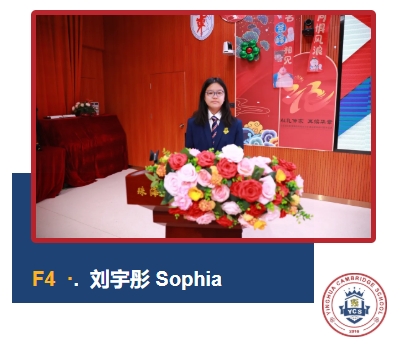
Hosts
A2 黄心盈 Doris/梁奕宁 Daniel
国旗下演讲
Speech Under the National Flag
学生代表
Student Representative

Our own Path - each traveller’s way is unique
The world contains countless roads, each traveller’s way is unique - even though our journeys often cross.
When we are born, we walk a unique road. As children this road is easy, we go to school, and we play with our friends. But when we grow up, the road becomes more complicated, and we face many choices: Which college do we go to? What job? These choices are a bunch of forks in the road, leaving us lost and confused.
But here's a problem, why is it so hard to choose?
• Some jobs we might love don't pay well.
• People might ask us to follow a different path.
• Everyone's health and body is different.
• We often pick what's safe, not what we love most.
Why is your own path important? When you do what fits you:
• Hard work feels good
• You keep going even when it's tough
• You believe in what you're doing
How to find your own path?
Explore the Inner Self: What activities make you feel lose track of time? These often point to your talents or passions.
What Matters Most to You? Think of 5 or more things you want most (like freedom, creativity, popularity).
Try to Imagine You "Can’t Fail": If you didn’t have to worry about money or what others think, how would you live?
Talk to people who have done it: Ask those with experience in the field you like to learn the truth, not just the good parts.
Common Challenges and Solutions
• Self-Doubt
- Focus on small wins: Keep a "success journal" to review past challenges you’ve overcome, boosting confidence.
- Redefine failure: See failures as a lesson, not a judgment on your worth.
• Outside Doubts
- Filter "noise" vs. "signal": Loved ones may worry out of care, but they might not see the full picture.
- Set a "feedback filter": Only listen to two types of people: Those who truly know you. Those you aspire to be like.
• Social Pressure (Fear of "Falling Behind")
- Compare progress, not people: Focus on improving 1% every day over competing with others.
- Collect "late bloomer" stories: Examples like J.K. Rowling who published Harry Potter at 32 ease age anxiety. Success doesn’t have to happen early.
The philosopher Kierkegaard once said: "Life can only be understood backwards, but it must be lived forwards." The answers often show themselves after you take that first step, not through endless worrying. We fear making wrong choices, but at the end of the day we still have to make a choice. As an old Chinese saying goes:“车到山前必有路,船到桥头自然直。” Ttranslated into English this is "The cart will find its way around the hill when it gets there, and the boat will straighten itself when passing under the bridge."
To conclude today's talk, I'd like to leave you with this phrase: "No road travelled is wasted - every step counts." I hope we all find the courage to forge our own extraordinary paths in life!
自己的路——每位旅行者都有独属的征程
世间道路有千万条,每位旅行者的征程都是独一无二的——纵使我们的足自己的路——每位旅行者都有独属的征程迹常会交错。
初临人世,我们便踏上了独属的路径。儿时,这条路平坦无忧,我们上学读书,与伙伴嬉戏。及至成年,前路渐显崎岖,无数抉择接踵而至:该入哪所大学?择何种职业?这些选择如同林立的岔道口,常常令我们彷徨迷失。
但问题在于:为何抉择如此艰难呢?究其原因:
• 心仪的工作或许报酬微薄
• 旁人总劝我们改弦易辙
• 各人身心禀赋迥异
• 我们常会选择稳妥,而非挚爱
为何坚守自己的路至关重要?当行于契合之径时:
• 辛劳亦觉甘饴
• 艰难不能阻碍前行
• 每一步都踏得笃定
所以该如何寻得自己的路呢?
• 探问本心:哪些事让你忘却时光流逝?这些往往便是天赋或热情所在。
• 何为生命至要?列举你最珍视的五样(如自由、创造、认同等)。
• 设想“绝对不会失败”:若无需顾虑金钱与他人眼光,你会如何生活呢?
• 咨询过来人:向心仪领域的实践者求教,了解光环背后的真相。
常见的困境与破局之道
• 自我怀疑
- 积微成著:撰写“成功日记”,重温我们过往攻克难关的经历。
- 重新定义失败:视挫折为人生的必修课,而非对其价值的否定。
• 外界质疑
- 辨别“杂音”与“信号”:比如有时亲友的忧虑出于关爱,却未必了解全貌。
- 设置“反馈过滤器”:只听两种人建言——真正懂你的人,你渴望成为的人。
• 同辈压力(焦虑“落后”)
- 与自我赛跑:专注每日进步1%,胜过与人比较。
- 收集“大器晚成”的故事:如J.K.罗琳32岁才出版《哈利·波特》,成功何必只争朝夕。
哲学家克尔凯郭尔曾说:“生活只能倒着被理解,却必须正着被经历。”答案总在你迈出第一步后显现,而不是在无尽的忧虑中。我们总恐惧选错,但终究必须选择。恰如中国古谚云:“车到山前必有路,船到桥头自然直。”
最后,请允许我以这句话作结:“人生没有白走的路,每一步都算数。”愿我们都有勇气,走出属于自己的非凡征程!
教师代表
Teacher Representative

Effort Requires Prioritization
Have you ever found yourself buried under piles of assignments, projects, and extracurricular activities, completely at a loss about where to begin? We all strive to succeed at school, but often, we waste valuable time and energy on less important tasks. Today, I want to talk about “Effort requires prioritization”.
1. The Problem: Unlimited Tasks, Limited Time
We all have 24 hours in a day, yet some people achieve extraordinary results while others struggle to keep up. The difference? Not just hard work, but working smart by focusing on the right things.
Imagine trying to fill a jar with rocks, pebbles, and sand. If you start with the sand, there’s no room for the rocks. But if you place the big rocks first, the smaller pieces fit around them. Life is the same - we must prioritize the "big rocks" first.
2. The Solution: The Eisenhower Matrix
One effective tool for prioritization is the “Eisenhower Matrix”, which divides tasks into four categories: important and urgent, such as an upcoming test or a project deadline, we should start immediately;Important but not urgent, like long - term projects or improving weak subjects, we can create a long - term plan; Urgent but not important, like attending unimportant meetings we can limit our involvement, and we should avoid tasks that are neither important nor urgent, such as excessive gaming or watching TV.
3. Three simple tricks
✓ Do 3 most important things first each day.
✓ Learn to say "No": "I can't join this activity."
✓ Color-code your work: Use colors to show what's most important.
Remember, it’s not only about how hard you work, but also about working smart. Let’s start prioritizing today and unlock our full potential!
努力要分轻重缓急
你是否曾发现自己被大量的作业、项目和课外活动所淹没,完全不知道从哪里开始?我们都努力在学校取得成功,但往往会把宝贵的时间和精力浪费在不太重要的任务上。今天,我想谈谈:努力要分轻重缓急。
1. 问题:任务无穷,时间有限
我们每天都只有24小时,但有些人能取得非凡的成就,而有些人却难以跟上节奏。区别在哪里?不仅在于努力,还在于努力的方向——通过专注于正确的事情来巧妙地工作。
想象一下,你要往一个罐子里装大石头、小石子和沙子。如果先装沙子,就没有空间放大石头了。但如果先把大石头放进去,小石子和沙子就能围绕在周围。生活也是如此——我们必须先确定“大石头”(重要事项)的优先级。
2. 解决方案:艾森豪威尔矩阵
一个有效的排序工具是“艾森豪威尔矩阵”,它将任务分为四类:
- 重要且紧急:比如即将到来的考试或项目截止日期,我们应该立即着手处理;
- 重要但不紧急:例如长期项目或提升薄弱学科,我们可以制定一个长期计划;
- 紧急但不重要:像参加无关紧要的会议,我们应该减少参与;
- 既不重要也不紧急:比如过度玩游戏或看电视,我们应该避免这类任务。
3. 三个简单的技巧
✓ 每天先做最重要的三件事。
✓ 学会说“不”:“我不能参加这个活动。”
✓用颜色标记你的工作:用颜色来突出显示最重要的事情并优先处理。
记住,关键不只在于你有多努力,还在于巧妙地努力。让我们从今天开始分清轻重缓急,进行任务优先排序,释放我们全部的潜力!